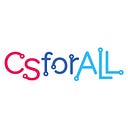What Can the Computer Science for ALL Community Learn from COVID-19
Now that we recognize COVID is here to stay, it is time for the CS community to rapidly reflect on the initial response and build toward progress
With the COVID-19 initial response behind us, we must continue to transform our behaviors and expectations in our organizations for the long-term, and perhaps even permanently. And to do so, we must reflect on what this pandemic has taught us as a #CSforALL community.
What We Have Learned:
Virtual Learning Does Not Equal Inclusive CS Education
There are significant inequities in access to devices and broadband that are preventing some students from fully engaging in virtual school lessons. This inequity existed before the crisis — prohibiting low income students from engaging in the same level of exploration of technology as their affluent peers — but has now dramatically increased its negative impact as technology becomes the only means for instruction.
As a community, we need to ensure all students have access to the tools with which we teach Computer Science and we need to build education approaches that are accessible to all students.
- Check out, ‘Implementing Inclusive Excellence into Virtual Learning Environments’
- 8 Ways to Be More Inclusive in Your Zoom Teaching
- ‘Drive-By Wi-Fi’: Hotspots Pop Up To Bridge Digital Divide
- Access To Cell Service and WiFi
Families are Critical Partners in the Delivery of Education
Not only has this time elevated the essential need for parents and families involvement for student learning, but has clearly illustrated the type of role that parents and families play in daily education. Family engagement also contributes to increasing inequities in education, many homes have parents who have received less years of formal education and are less capable of assisting their children with homework and other instructional support.
It is now CS educators role to engage parents and families in programs and offerings for students to be fully active in their education.
- Read ‘Tips for Supporting Parents and Families’
- See https://stemnext.org/engaging-families/ for family engagement resources.
Quick CS Resources Are Not the Final Solution
In a supportive manner, the CS community rapidly responded to gather, build, and distribute CS resources to educators, students, and stakeholders. The response was “great”, but as time pushed on the struggles came forward of what they were going to do with all these resources. How are these educators, students, and stakeholders supposed to build a sustainable education system for learning with these resources? How do they know which resources are more appropriate for their students?
Often the first identified problem is not the greatest hurdle. In this situation, we know that schools and districts are critical problem solvers and we must give the systems time to identify challenges and adjust within their existing means before “rushing in”. Once we let the existing systems define what they can and cannot solve, then philanthropy can invest where it will have the greatest impact.
A CS Talent Pipeline Whose Educational Pathway Has Been Irreparably Disrupted
Due to the pandemic, a large amount of students won’t have optimal CS education and experiences as those before and after them (competitions, awards, exam scores). This is important to acknowledge because low income students often rely on markers — such as competitions and recognitions — as a stand-in for the increasingly important social capital and networks in the field that they and their families may lack. We need to examine our recognition and promotion systems now more than ever, and dismantle the structural barriers that might count these students out. This will both benefit this crop of students, and those that come after them.
Communication During a Pandemic is Complex
If you listen to the reporters from Washington State, they often speak about how their initial response was negligent. Getting the news, breaking the news, and sharing the news was the necessary protocol. Though as time carried the virus throughout the nation, the safety, the sensitivity, and the creativity of the reporter and story was the new protocol.
Most CS organizations and stakeholders aren’t in the field, but the communication pressure, sensitivity, and understanding was heightened from day one. We know the initial response will not be the last, and the sensitivity of our message must remain grounded if we truly want to support one another.
CSforALL’s response was to support the greater CS community and stakeholders through a series of webinars, along with sharing and connecting members, partners, and resources. Together we will address and grow from the learnings of this pandemic. In our pandemic environment, we truly believe that we can take this moment in time to transform and continue our work within the mission of Computer Science for ALL.
For more #CSforALL COVID-19 related stories: https://www.csforall.org/about/novel-coronavirus-covid-19/
